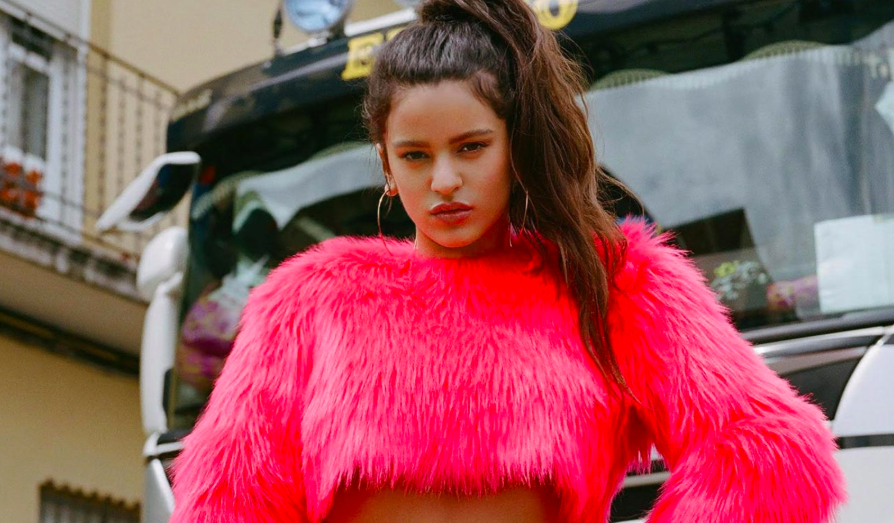Our theme for the month of September is Alphabet Soup. Each writer was assigned a letter and will title their post “___ is for ___.” We take a short break from the English alphabet today.
An important linguistic note before we begin: Every time the letter “R” appears at the beginning of a Spanish word, it should be rolled just as a “rr” in the middle of Spanish word is. Thus, you should trill the hell out of “Rosalía”!
In the summer of 2017, Taylor Swift altered the pop music landscape when she sneered “Ooo! Look what you made me do!” along radio waves across the country. Not long after, Katy Perry dropped her abominable album Witness, which saw her coolly dishing out disses with a brisk “Swish, swish, bitch!” and attempting to harden her cotton candy pop to rock candy. Then, Ariana Grande’s thank u you, next arrived in early 2019, brandishing the clipped chorus of the titular track and passionless, slinking (and comma-splicing) singles “7 rings” and “break up with your girlfriend, i’m bored.”
The message was clear: pop’s top divas were ditching their shiny, upbeat bops sung at the top of lungs in Priuses across the nation for the menacing gloss of a black Ferrari purring in a back alley. The songs they crafted generated their energy not from soaring melodies (or really any display of vocal range at all) but instead from swerving rhythms and artificially injected attitude. But for pop’s previously skip-in-their-step elite, the attempt at swagger felt inauthentic.
Enter Rosalía.
Born in Spain’s region of Catalonia, Rosalía has charged onto the music scene like a bull rounding a corner on the streets of Pamplona. In “Malamente,” the opening track of her 2018 album, El mal querer, she effortlessly exudes a swagger not felt since Rihanna’s seminal track “Work.” In a near whisper, Rosalía’s voice floats over the rapid Spanish consonants and stings with a potent severity. The music world noticed: “Malamente” won her two Latin Grammys.
However, Rosalía has offered something else that other recent pop records have lacked: depth. While Taylor Swift and Katy Perry dished up diss tracks over a rumored feud of stolen back-up dancers and Ariana simmered over a whirlwind engagement with SNL’s Pete Davidson, Rosalía chose to draw inspiration for El mal querer (roughly translated to “the bad desire”) from a thirteenth-century romance novel, Flamenca, about a woman whose jealous husband locks her in a tower. (Put down your receipts, Taylor and Katy! Did you hear that?! Locked in a frickin’ tower!)
In fact, Rosalía’s entire album is divided into chapters, with each track having both a track name and an ancient, brooding chapter title like “Augury,” “Liturgy,” and “Power.” These esoteric, archaic quirks lend a mysticism and profundity to Rosalía’s work that makes Ariana Grande’s “My Favorite Things” sample feel flimsy by comparison.
Rosalía does not only achieve this depth via obscure literary references but also through a rich blend of sounds and musical traditions. While modern listeners may feel very at home in the hip-hop-infused “Malamente,” the rattling guitar and terse claps that announce the second track, “Qué no salga la luna” disorientingly teleport listeners from a gritty Los Angeles alleyway to a white cave buried deep beneath Granada where colorful dresses ruffle and flap through the air. The album continues to wrestle between the hooks of modern pop and staccato of traditional flamenco, elevating both genres to new places and establishing Rosalía as a figurehead of a fresh, young Spain.
It should also be noteworthy that Rosalía won her two aforementioned Latin Grammys given her strong Spanish identity. Latin America, by definition, includes Mexico, Central America, South America, and various Caribbean islands and expressly excludes the conquesting Spain. But Rosalía is boldly Spanish. In her staggering music videos for “Malamente” and “Pienso en tu mirá,” she mines deeply entrenched symbols of Spanish culture to create haunting images of young boys soberly training to be matadors and olives glistening like bull’s black eyes and overturned semi-trucks hemorrhaging oranges as they quietly smolder. Rosalía manages to marry the coolness of a modern pop auteur with the sublime terror of a Dalí painting.
And the music world, again, has taken note. In the year since the release of El mal querer, Rosalía has proved herself a musical chameleon, hopping on suave dance tracks with the likes of J. Balvin, pairing with British crooner James Blake for his trembling “Barefoot in the Park,” and tackling big concepts like the corrupting influences of luxury in her coupled tracks “Fucking Money Man” and “Dio$ No$ Libre Del Dinero” (“May God Free Us From Money”). Rosalía pivots between moods, tones, and genres as deftly as she flicks between Catalan, Spanish, and English—always changing but never losing her distinctive flavor or effortless swagger.
Rosalía is seizing the pop world with a sound all her own. It’s time to take note.

Gabe Gunnink (’14) lives in Seattle, where he works for a European travel company and gawks at the landscapes and skylines surrounding him. In his free time, he enjoys practicing Portuguese under his breath on city buses, running far enough to justify eating an entire pan of cinnamon rolls, and faithfully implementing Oxford commas.









Gabe! You never cease to astound me by your use of words and now depth of music knowledge and understanding. Rosalîa needs you to write for her…but be cautious if you meet Taylor or Katy on the street! I love your use of metaphors and especially the black Ferrari Run with the passion of Rosalia’s music and you are sure to meet and exceed your goal. Fly like the wind!!
Love not only learning about an awesome artist but also your take on what pop songs should draw from in a culture. It seems like the best art is the one that makes the old things new again by situating it in a new time and place. Thanks in advance for the new music!
Thank you for the kind comment, Alex! I actually recently discovered that Rosalía also came under fire for mimicking the accent of the Romani people in Andalusía when she herself is from Catalonia. So, she became a bit embroiled in the great debate over cultural appropriation!
Nevertheless, I’d love to know what you think of the album!